
Speed limits on road traffic, as used in most countries, set the legal maximum speed at which vehicles may travel on a given stretch of road. Speed limits are generally indicated on a traffic sign reflecting the maximum permitted speed, expressed as kilometres per hour (km/h) or miles per hour (mph) or both. Speed limits are commonly set by the legislative bodies of national or provincial governments and enforced by national or regional police and judicial authorities. Speed limits may also be variable, or in some places nonexistent, such as on most of the Autobahnen in Germany.
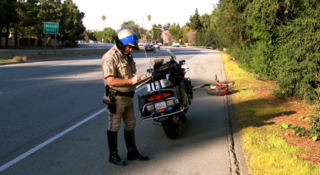
A highway patrol is a police unit, detail, or law enforcement agency created primarily for the purpose of overseeing and enforcing traffic safety compliance on roads and highways within a jurisdiction. They are also referred to in many countries as traffic police, although in other countries this term is more commonly used to refer to foot officers on point duty who control traffic at junctions.

Road traffic safety refers to the methods and measures used to prevent road users from being killed or seriously injured. Typical road users include pedestrians, cyclists, motorists, vehicle passengers, and passengers of on-road public transport.

A shoulder, hard shoulder or breakdown lane is an emergency stopping lane by the verge on the outer side of a road or motorway. Many wider freeways, or expressways elsewhere have shoulders on both sides of each directional carriageway—in the median, as well as at the outer edges of the road, for additional safety. Shoulders are not intended for use by through traffic, although there are exceptions.

A department of motor vehicles (DMV) is a government agency that administers motor vehicle registration and driver licensing. In countries with federal states such as in North America, these agencies are generally administered by subnational entities governments, while in unitary states such as many of those in Europe, DMVs are organized nationally by the central government.

Rumble strips are a traffic calming feature to alert inattentive drivers of potential danger, by causing a tactile fuzzy vibration and audible rumbling transmitted through the wheels into the vehicle interior. A rumble strip is applied along the direction of travel following an edgeline or centerline, to alert drivers when they drift from their lane. Rumble strips may also be installed in a series across the direction of travel, to warn drivers of a stop or slowdown ahead, or of an approaching danger spot.

The Manual on Uniform Traffic Control Devices for Streets and Highways is a document issued by the Federal Highway Administration (FHWA) of the United States Department of Transportation (USDOT) to specify the standards by which traffic signs, road surface markings, and signals are designed, installed, and used. In the United States, all traffic control devices must legally conform to these standards. The manual is used by state and local agencies as well as private construction firms to ensure that the traffic control devices they use conform to the national standard. While some state agencies have developed their own sets of standards, including their own MUTCDs, these must substantially conform to the federal MUTCD.
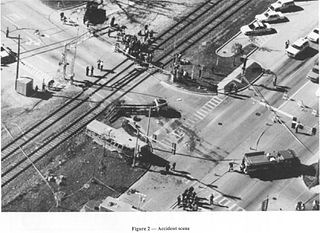
The 1995 Fox River Grove bus–train collision was a grade crossing collision that killed seven students riding aboard a school bus in Fox River Grove, Illinois, on the morning of October 25, 1995. The school bus, driven by a substitute driver, was stopped at a traffic light with the rearmost portion extending onto a portion of the railroad tracks when it was struck by a Metra Union Pacific Northwest Line train, train 624 en route to Chicago.

Vehicle and Operator Services Agency (VOSA) was an executive agency granted trading fund status in the United Kingdom sponsored by the Department for Transport of the United Kingdom Government.
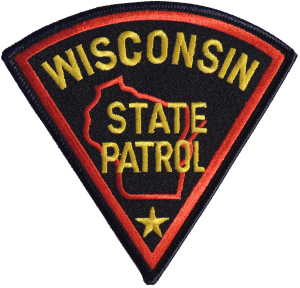
The Wisconsin State Patrol is the state patrol for the state of Wisconsin and is a division of the Wisconsin Department of Transportation. The Wisconsin State Patrol enforces traffic and criminal laws, oversees the motor carrier safety and weight facilities (SWEFs), inspects and regulates motor carriers, school buses and ambulances, and assists local law enforcement agencies with traffic safety, civil disturbances and disasters.

Road traffic control involves directing vehicular and pedestrian traffic around a construction zone, accident or other road disruption, thus ensuring the safety of emergency response teams, construction workers and the general public.

Autobahnpolizei is the term in Germany for the highway patrol. Heavy traffic and high-speed accidents resulted in the creation of special police units to patrol the expressways known as Autobahnen.

A move over law is a law which requires motorists to move over and change lanes to give safe clearance to law enforcement officers, firefighters, ambulances, utility workers, and in some cases, tow-truck drivers and disabled vehicles. In the past, Canada and United States have used this ter to two different concepts; however, this is beginning to change as Canadian provinces have begun expanding the scope of their move over laws.

Speed limits are enforced on most public roadways by authorities, with the purpose to improve driver compliance with speed limits. Methods used include roadside speed traps set up and operated by the police and automated roadside 'speed camera' systems, which may incorporate the use of an automatic number plate recognition system. Traditionally, police officers used stopwatches to measure the time taken for a vehicle to cover a known distance. More recently, radar guns and automated in-vehicle systems have come into use.

Various laws in the United States regulate the use of mobile phones and other electronics by motorists. Different states take different approaches. Some laws affect only novice drivers or commercial drivers, while some laws affect all drivers. Some laws target handheld devices only, while other laws affect both handheld and handsfree devices.
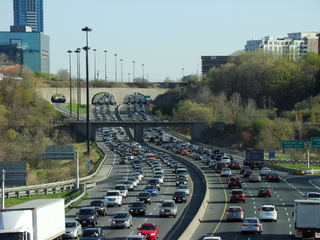
Terminology related to road transport—the transport of passengers or goods on paved routes between places—is diverse, with variation between dialects of English. There may also be regional differences within a single country, and some terms differ based on the side of the road traffic drives on. This glossary is an alphabetical listing of road transport terms.
Osita Benjamin Chidoka is a Nigerian politician, public servant and administrator. He was Nigeria's Minister of Aviation under President Goodluck Jonathan and also served as Corps Marshal and Chief Executive of the Federal Road Safety Corps under President Olusegun Obasanjo.
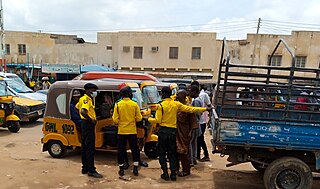
Kano Road Traffic Agency (KAROTA) is a government agency responsible for traffic management and control, road safety, and other related matters within Kano State. The agency was established in 2012 with the mandate of ensuring safety on the roads, reducing accidents, and ensuring the free flow of traffic. KAROTA operates in collaboration with other law enforcement agencies such as the Nigeria Police Force and the Federal Road Safety Corps (FRSC) to maintain law and order on the roads.
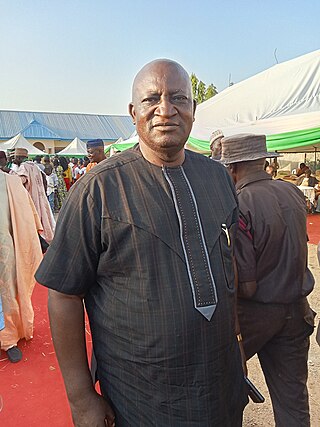
ACM Ayuba Gora Wobin was the Sector Commander of the Federal Road Safety Commission (FRSC) Federal Capital Territory Command, Abuja. He retired as the Assistant Corps Marshal Corps Secretary of the FRSC on 19 June 2023.
Yobe state road traffic management agency (YOROTA) is a government agency responsible for traffic management and control, road safety, and other related matters within Yobe State. The agency was established in 2019 with the mandate of ensuring safety on the roads, reducing accidents, and ensuring the free flow of traffic. YOROTA operates in collaboration with other law enforcement agencies such as the Nigeria Police Force and the Federal Road Safety Corps (FRSC) to maintain law and order on the roads.



















